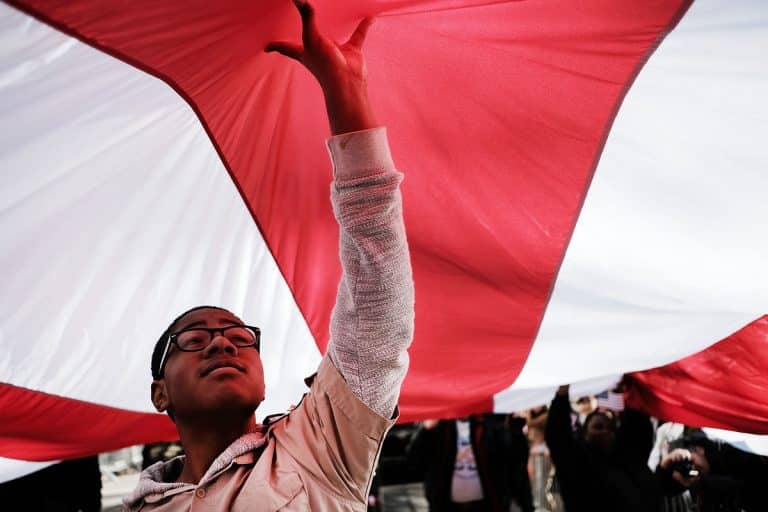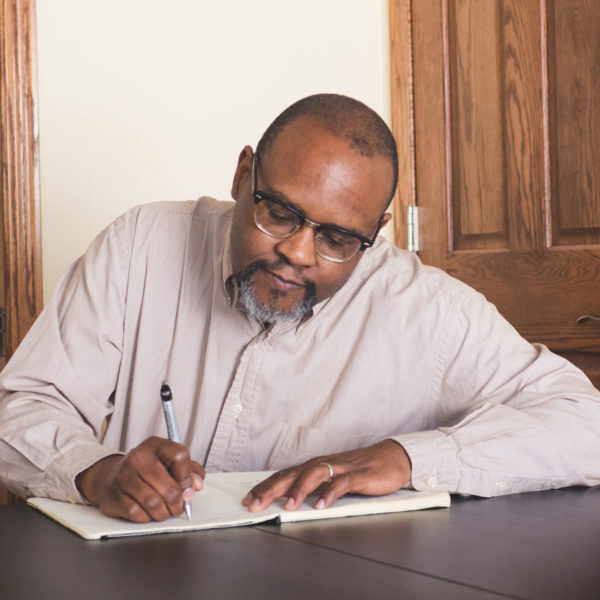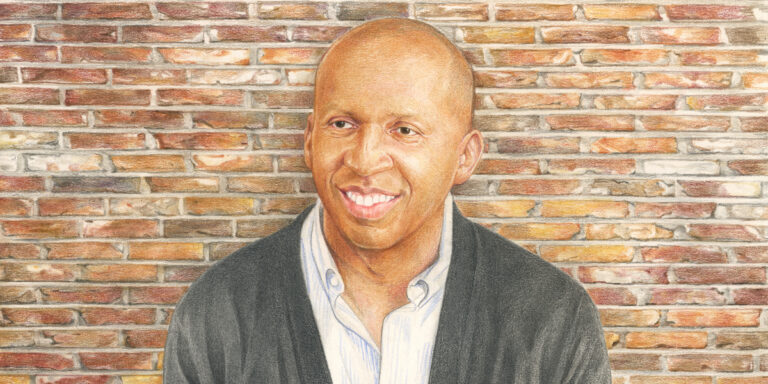
Image by Spencer Platt/Getty Images, © All Rights Reserved.
The Question of Redemption in America
“There’s no coming to consciousness without pain.”
— Carl Jung
I’ve been writing nearly all my life, from the time I first drew cursive letters on an empty grocery bag, but I’ve never needed words more than now. And I’m not just turning to words to express my own turmoil.
You see, reading and listening first fueled my desire to write, and we have piled our times high with words, often collapsing into cacophony. Yes, these are rich and urgent times for listening. But like a musician, a writer listens both for the notes and for the spaces between them, the interplay of sound and silence that generates all that the music can evoke in us. And so it is with words.
On Being’s recent two-part conversation on the interplay of religion and politics (“Sinfulness, Hopefulness, and the Possibility of Politics” with David Brooks and E.J. Dionne and “How to Live Beyond This Election” with Eboo Patel and Natasha Trethewey) appealed to me for all the reasons above. In both, I heard compelling, measured words, expressions of yearning for common ground, mutual respect, and understanding, words of hope, compassion, and justice.
But I turn here to certain loud silences among those words, things unspoken that inhibit our ability to enact the intentions expressed. And the loudest silence I heard surrounded the word “redemption.”
I first learned about redemption on my knees in the confessionals of my childhood and youth. Raised a Roman Catholic, I went to confession every week or so preparing to accept the host or bread — the body of Christ — at Communion during Mass. I wanted to be a proper vessel to receive what we were taught was Christ’s physical presence, a presence that was proof of our redemption.
My favorite part of the liturgical calendar were the 40 days of Lent. The dust thumbed onto my forehead on Ash Wednesday matched the brokenness I felt inside, struggling in a troubled family. During Lent, the church urged pausing from life’s headlong rush and looking at our failings and the harms we had visited on others — and on ourselves. And we were promised that by admitting our wrongs, grieving our failings, and performing penance, we could feel the fullness of divine love and the chance to begin again.
Decades later, in adulthood, I began attending meetings of Al-Anon, the 12-step program for those who have been affected by the alcoholism of a loved one. Reeling in the final stages of my first marriage but no longer comforted by formal religion, I needed a way to make sense of my existence, a way to wholeness. I knew the alcoholism I had seen in my family growing up had affected me, and I hoped Al-Anon would give me a way to heal. And there I discovered the same sequence I had learned as a boy: accepting the limits of what I could control, admitting how in my hubris I had wronged others and myself, grieving my wrongs, and seeking ways to make amends for them: redemption.
I no longer belong to any religion, but I still turn to these words because they speak to our yearning, our ultimate aspirations of the people we want to be. They also speak our failings, the broken places within us that split us, block our journey and push our dreams into the distance. But most importantly for us as a nation, I hear in the language of redemption the words we need to end our silences.
In them I hear the language — and process — of justice, because redemption and justice are intertwined. What is redemption but the attempt, through acceptance of and grief for our fallibility, to atone for our wrongs and reestablish honest relationships?
As a Catholic, I sought an honest relationship with God. In Al-Anon, I worked to be honest and decent with others in my life. And in seeking justice, we try to establish honest, loving relationships with our fellow citizens and with other citizens of the world.
But that can’t happen in a politics of silence and dishonesty, not when we refuse to name all the ways in which we’re broken. It can’t happen when the people in the United States, particularly whites, refuse to see that our country was founded in brokenness and has never left that ground.
Our inability to honestly address one another and honestly see ourselves isn’t new. It didn’t begin with neoliberalism or the rise of the 1 percent; it didn’t start with factory closings or globalism or the plight of the white working class. Our country was broken out of the box.
The United States is like one of those beautifully wrapped Christmas presents you get as a child, one you’ve desired as soon as you saw it on TV. You knew it was expensive, but you could taste how much you wanted it. And somehow, on Christmas morning, you could tell through the fancy wrapping that your dream had come true. But as soon as you opened the box, you knew it didn’t work as advertised. But knowing, too, what your parents had sacrificed, you decided to make do. In fact, you would insist it was the best present ever, perfect in every way; you told yourself it could still be a great toy so long as you ignored its flaws.
That’s what happens when something is broken out of the box: You become afraid to tell the truth because you fear the truth will ruin it.
So we diminish the attempted genocide of Native Americans and rename it the “Westward expansion.” We pretend that blacks found slavery palatable, and that the Civil War “freed” them; we ignore the violent end of Reconstruction and pretend that Jim Crow is long dead, though segregation and legal and economic inequity continue right up to the present day.
We claim that we welcomed immigrants with open arms when actually we described each wave in turn as beasts unfit for democracy. And we say we have treated women with decency and progressive attitudes when we still refuse them equal pay, sexually objectify, victimize, then stigmatize them, and deny them control over their own bodies. Then, when white men — the nation’s most powerful demographic — encounter setbacks, we demand empathy for them while explaining away police killings of unarmed men, women, and children of color and LGBT folks.
We ask women (white and non-white) and men of color to exercise empathy as if the ability to empathize with and understand white men has not been part of the survival toolkit of the oppressed in the United States for hundreds of years. As if understanding white men has ever been optional for the oppressed. As if the price of failing to understand white men has not often been humiliation, subjugation, disenfranchisement, and even death.
For the purposes of redemption, the myth of the United States as a newly broken nation must end. But our avoidance of these realities, our silences concerning the myth, aren’t hard to understand. Any priest, rabbi, imam, coach, or personal trainer can tell you. They boil down to this simple truth: The work of redemption hurts like hell.
I was terrified every time I knelt in the confessional to share my sins. Lent demanded my honesty and humility; it asked me for a spiritual accounting, to look at my life not through a material lens but in relation to other human beings and ultimate concerns. In Al-Anon, my palms would grow sweaty when I made myself tell my story, revealing my failings to everyone else in the room. I knew I was making myself vulnerable to the judgment of others. I knew it involved risk.
But the greater pain and grief involved facing the fact that I had never been the person I thought I was. It was, in a way, like facing a death, except that the corpse was myself, and I was attending my own funeral. And I could only hope against hope that some worthwhile new version of me would come out the other side.
That tension between the desire for truth and the fear of the fundamental disruption that truth brings to our lives twists us into the most grotesque contortions of word and action (or inaction). We end up like an impossibly knotted rope or a tangle of snakes in which means and ends, head and tail become indistinguishable from one another.
Redemption is not a happy project. It isn’t fun. You enter redemption through grief. It is sackcloth and ashes, a recognition that you have caused pain by deliberately choosing illusion over truth. Redemption means engaging in, as they say in Al-Anon, “a searching and fearless moral inventory.” If you think you’ve embarked on redemption and you are still smiling and bright with pride, then somewhere you have taken a wrong turn.
But despite its costs, redemption — justice — is the only project that can save us. The only path that, as so often has been said of the truth, can set us free. In this election, we have, across the political spectrum, in both gloating and recriminations, chosen the opposite. Can we muster now, at this late hour, the courage to confess our fundamental brokenness? Can we find the words, at long last, to tell ourselves the truth?


Share your reflection